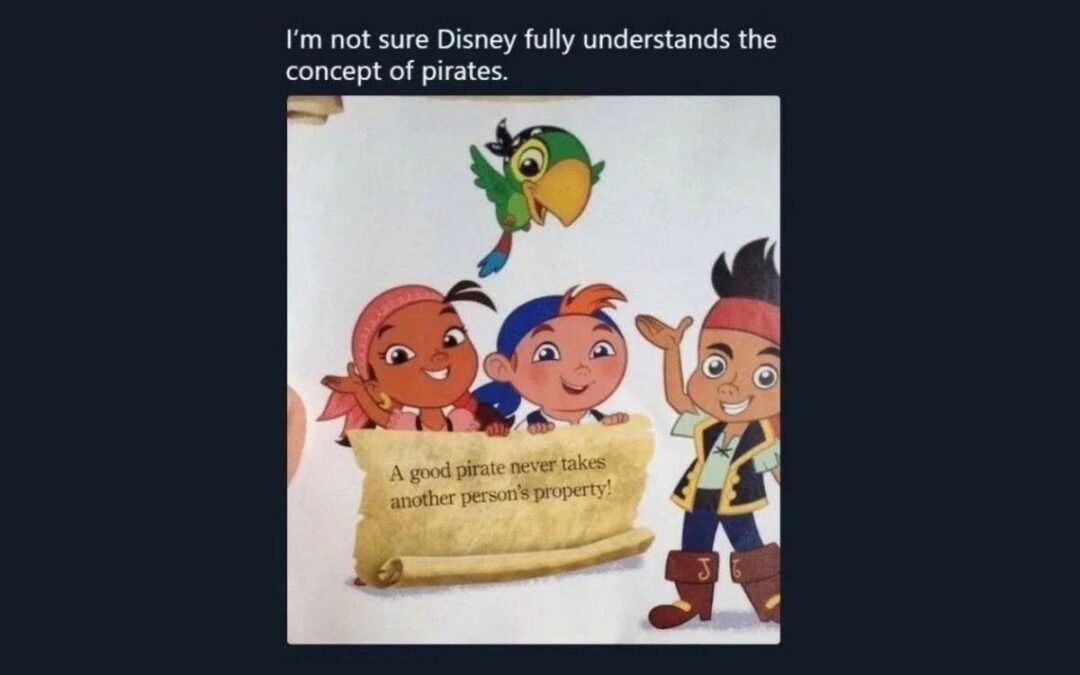There are at least three things I didn’t know about pirates:
One: The Jolly Roger was a symbol of not so much a threat to others (“you are going to die”), but more of sheer defiance (“we know we are going to die”). Pirates knew that they had signed their own death warrants once on land, and to go rogue was to embrace this fate on their way to hell. Crews making out such a flag on the horizon would have found this even more terrifying.
Two: Despite the image and myth they (very intentionally) created during their own time, and which persists to this day, pirate captains were actually not the terrifying authoritarian despots we believe them to be, but sort of temporary firsts among equals, as they only had authority during chase or battle and the rest of the time all issues aboard a ship were decided very much democratically, and captains could be removed by majority vote at any time.
Three (and this is so random): Peter the Great of Russia contemplated using alliance with the pirates (via, likely, conmen ‘envoys’ of the pirate kingdom that have tried to weasel their way into many royal courts of Europe of the time) to establish a Russian colony on Madagascar.
Why am I talking about pirates, you ask?
To be honest, that’s unclear even to me.
I picked up – and just finished reading – David Graeber’s Pirate Enlightenment, or the Real Libertalia. I have a bit of an intellectual crush on David right now and ripping through all his books – this is my third, after The Dawn of Everything and Bullshit Jobs, both of which I highly recommend.
As an aside: if you don’t know who David Graeber was (he sadly and suddenly passed away in 2020 from a COVID-19 related complication, he was only 59), he was an American anthropologist and anarchist activist and had a leading role in the Occupy movement. In short, he was a very, very smart guy and an unusual, lateral thinker. All this to say: read his books.
Anyway, back to pirates.
When pirates settled on Madagascar in the 17th and 18th centuries (it being a convenient resupply and booty hiding spot in general, and the native population being amenable to alliances with them), some of them recreated their egalitarian approach to governance on land, no doubt being also influenced by local traditions and approaches (e.g. the ‘kabary’, or consensus-making gatherings of all people of the clan or village).
Graeber argues that – at least in part – some the Enlightenment authors must have been influenced by these ideas of egalitarian pirate societies that became stuff of legends and much talk in the salons of Europe of the time. Books like “A General History of the Pyrates” written, supposedly by Daniel Defoe under pseudonym Captain Charles Johnson, became extremely popular.
In fact – as he explores in more depth in The Dawn of Everything – a lot of the Enlightenment thought we associate with “western” ideals of free and fair societies, came from sources outside of the “western” tradition, for example from Native American Huron statesman Kandiaronk, the women traders of Betsimisaraka in Madagascar who struck alliances with pirates, and of course ideas and traditions of Muslim and Chinese thinkers of centuries prior. “Existing history is not just deeply flawed and Eurocentric, it’s also unnecessarily tedious and boring”, Graeber writes.
So what can we learn from David – and the pirates – then? (This is a very very bad segue but I can’t quite trace how my brain made the connections between pirates and this next bit but it did, so it is what it is).
One: Embrace chance encounters and follow your curiosity, see where it leads. David, it turns out, got introduced to the idea of pirate lineage on Madagascar after a fling with a local woman who claimed she was a descendant of pirates of Betsimisaraka Confederacy. He got curious, and here we are (many, many years later), reading his book.
Two: You don’t have to have all the answers. Pirate Enlightenment asks more questions than it answers – and openly so. Not every project has to arrive at a neat or groundbreaking conclusion, but you can start a conversation that others can build on. We don’t need more ‘gurus’ who have all the answers. We need more ‘kabaris’: gatherings, discussions, taking nuggets of ideas, evolving them and building on them as a collective.
Three: Embrace fringe topics. When I work with photographers wanting to start a personal project, they often say they don’t think their idea is worth pursuing because it’s a tiny, fringe topic – or something very personal – that no one else would be interested in. I always encourage them to go for it anyway because very often personal is actually universal – and inevitably, their story resonates deeply with people. I have to remind this fact to myself often, too.
Four: Break rules, go against the grain, build new things. Who cares if you succeed or not. Betsimisaraka Confederacy only lasted a few decades before falling apart. But it inspired much storytelling in its own time – and here we are, reading about it, all those centuries later. The prize and the treasure (yes that’s a pirate reference) is in the chase process, not the result.

